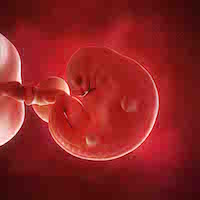5 Weeks Pregnant
Congratulations! Week five of pregnancy probably brings a positive pregnancy test. Even though this may be the week you officially confirm your pregnancy, you already are considered to be five weeks pregnant, which means only 35 more weeks to go.
What’s happening with your body?
 Your period is nowhere in sight, which may have been your first clue you are pregnant. About a week to 12 days after implantation, human chorionic gonadotropin is produced. By week five of your pregnancy, levels of the hormone are often high enough to produce a positive pregnancy test. In addition to human chorionic gonadotropin hormone, you are also producing more progesterone and estrogen to support your pregnancy and developing baby.
Your period is nowhere in sight, which may have been your first clue you are pregnant. About a week to 12 days after implantation, human chorionic gonadotropin is produced. By week five of your pregnancy, levels of the hormone are often high enough to produce a positive pregnancy test. In addition to human chorionic gonadotropin hormone, you are also producing more progesterone and estrogen to support your pregnancy and developing baby.
Increases in estrogen are essential for a healthy pregnancy for a variety of reasons. Estrogen helps your uterus expand and makes room for your growing baby. It also increases blood circulation and maintains the uterine lining. Estrogen triggers the production of other hormones and plays a part in the development of some of your baby’s organs.
Another important hormone you are producing in week five of pregnancy is progesterone. Progesterone is needed to keep the placenta healthy and functioning. It also stimulates breast tissue growth.
Although the increase in hormones is great for your developing baby, those extra hormones are also responsible for some of your pregnancy side effects that may have started to kick in. For example, you may be already starting to feel a few early pregnancy symptoms including sore breasts and a bit of nausea. Some women also feel very tired during this early stage of pregnancy. But keep in mind, all women are different, and some sail through pregnancy with few discomforts.
What’s happening with your baby?
 Your baby is about as big as an orange seed and is technically referred to as an embryo. Your little embryo has a long way to go but is growing fast.
Your baby is about as big as an orange seed and is technically referred to as an embryo. Your little embryo has a long way to go but is growing fast.
One exciting development is your baby’s heart is starting to form. It’s hard to imagine, but this tiny embryo has two small heart tubes, which are already beating. It will take a few more weeks before the beats become coordinated. At that time, the two tubes fuse together, and your baby’s heart is fully functioning.
In addition to his heart, other organs are also forming. Your baby’s neural tube is developing. The neural tube is what will eventually become your baby’s spinal cord and brain. Because the neural tube develops so early in pregnancy, anything you can do to ensure proper development is essential. That’s why taking folic acid supplements is so important. Studies have linked deficiencies to an increased risk of birth defects.
Things to keep in mind:
Since pregnancy is now confirmed, you may want to cut a few things out of your diet. For example, fish high in mercury and unpasteurized foods, such as certain types of cheese, will have to stay off your menu for the next nine months. If you eat unpasteurized foods, you put yourself at risk for foodborne illnesses that could hurt your baby.
Eating fish high in mercury can lead to problems with your baby’s brain and nervous system development. You don’t have to steer clear of all fish. In fact, certain fish, such as trout and salmon are high in fatty acids and good for you. Types of fish you should avoid during pregnancy include king mackerel, swordfish and shark.
Once you have a positive pregnancy test, you also need to think about prenatal care. Prenatal care is essential to make sure you and your baby stay healthy throughout your pregnancy. It also helps identify any potential problems before they become serious.
Your choices for prenatal care include a midwife or obstetrician/ gynecologist. If you already have a gynecologist, you may want to keep the same doctor to care for you during pregnancy.
If you have been going to your general practitioner for yearly gynecological exams and don’t have a gynecologist, ask your friends, family or your primary care doctor for a referral.
Once you choose your healthcare practitioner, call and let them know you are pregnant. Some doctors prefer to schedule women for their first prenatal appointment once they reach their eighth week of pregnancy.